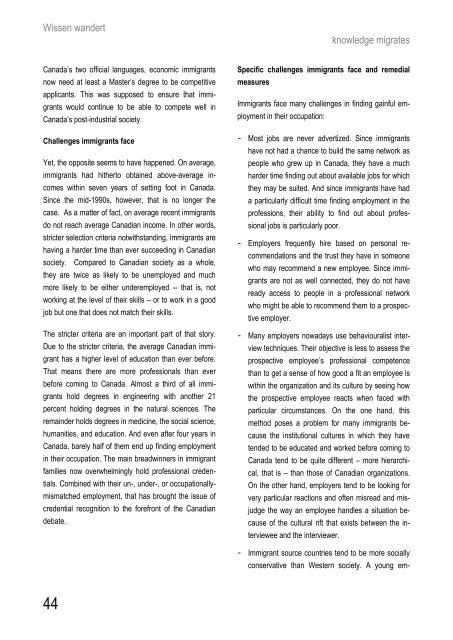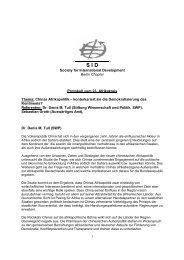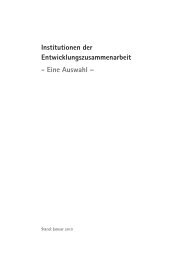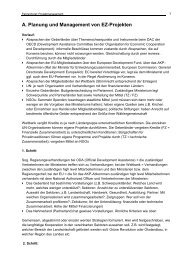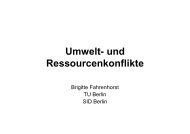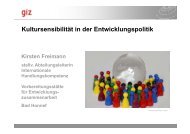Konferenzbericht (PDF-Dokument, 3 MB) - SID
Konferenzbericht (PDF-Dokument, 3 MB) - SID
Konferenzbericht (PDF-Dokument, 3 MB) - SID
Erfolgreiche ePaper selbst erstellen
Machen Sie aus Ihren PDF Publikationen ein blätterbares Flipbook mit unserer einzigartigen Google optimierten e-Paper Software.
Wissen wandert<br />
Canada‟s two official languages, economic immigrants<br />
now need at least a Master‟s degree to be competitive<br />
applicants. This was supposed to ensure that immi-<br />
grants would continue to be able to compete well in<br />
Canada‟s post-industrial society.<br />
Challenges immigrants face<br />
Yet, the opposite seems to have happened. On average,<br />
immigrants had hitherto obtained above-average in-<br />
comes within seven years of setting foot in Canada.<br />
Since the mid-1990s, however, that is no longer the<br />
case. As a matter of fact, on average recent immigrants<br />
do not reach average Canadian income. In other words,<br />
stricter selection criteria notwithstanding, immigrants are<br />
having a harder time than ever succeeding in Canadian<br />
society. Compared to Canadian society as a whole,<br />
they are twice as likely to be unemployed and much<br />
more likely to be either underemployed -- that is, not<br />
working at the level of their skills – or to work in a good<br />
job but one that does not match their skills.<br />
The stricter criteria are an important part of that story.<br />
Due to the stricter criteria, the average Canadian immi-<br />
grant has a higher level of education than ever before.<br />
That means there are more professionals than ever<br />
before coming to Canada. Almost a third of all immi-<br />
grants hold degrees in engineering with another 21<br />
percent holding degrees in the natural sciences. The<br />
remainder holds degrees in medicine, the social science,<br />
humanities, and education. And even after four years in<br />
Canada, barely half of them end up finding employment<br />
in their occupation. The main breadwinners in immigrant<br />
families now overwhelmingly hold professional creden-<br />
tials. Combined with their un-, under-, or occupationally-<br />
mismatched employment, that has brought the issue of<br />
credential recognition to the forefront of the Canadian<br />
debate.<br />
44<br />
knowledge migrates<br />
Specific challenges immigrants face and remedial<br />
measures<br />
Immigrants face many challenges in finding gainful em-<br />
ployment in their occupation:<br />
- Most jobs are never advertized. Since immigrants<br />
have not had a chance to build the same network as<br />
people who grew up in Canada, they have a much<br />
harder time finding out about available jobs for which<br />
they may be suited. And since immigrants have had<br />
a particularly difficult time finding employment in the<br />
professions, their ability to find out about profes-<br />
sional jobs is particularly poor.<br />
- Employers frequently hire based on personal re-<br />
commendations and the trust they have in someone<br />
who may recommend a new employee. Since immi-<br />
grants are not as well connected, they do not have<br />
ready access to people in a professional network<br />
who might be able to recommend them to a prospec-<br />
tive employer.<br />
- Many employers nowadays use behaviouralist inter-<br />
view techniques. Their objective is less to assess the<br />
prospective employee‟s professional competence<br />
than to get a sense of how good a fit an employee is<br />
within the organization and its culture by seeing how<br />
the prospective employee reacts when faced with<br />
particular circumstances. On the one hand, this<br />
method poses a problem for many immigrants be-<br />
cause the institutional cultures in which they have<br />
tended to be educated and worked before coming to<br />
Canada tend to be quite different – more hierarchi-<br />
cal, that is – than those of Canadian organizations.<br />
On the other hand, employers tend to be looking for<br />
very particular reactions and often misread and mis-<br />
judge the way an employee handles a situation be-<br />
cause of the cultural rift that exists between the in-<br />
terviewee and the interviewer.<br />
- Immigrant source countries tend to be more socially<br />
conservative than Western society. A young em-


